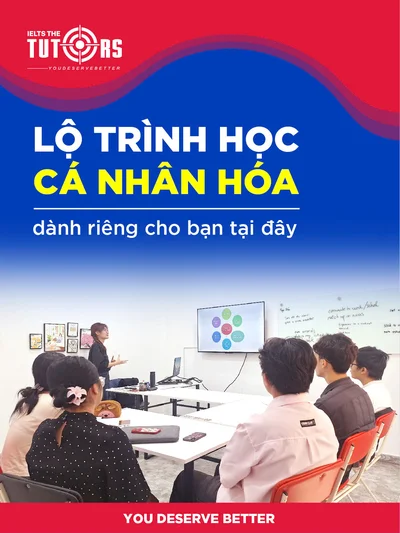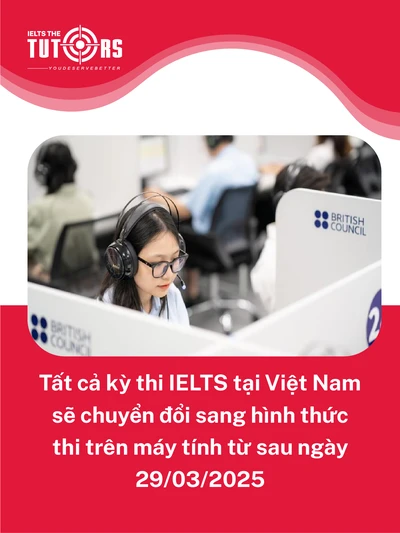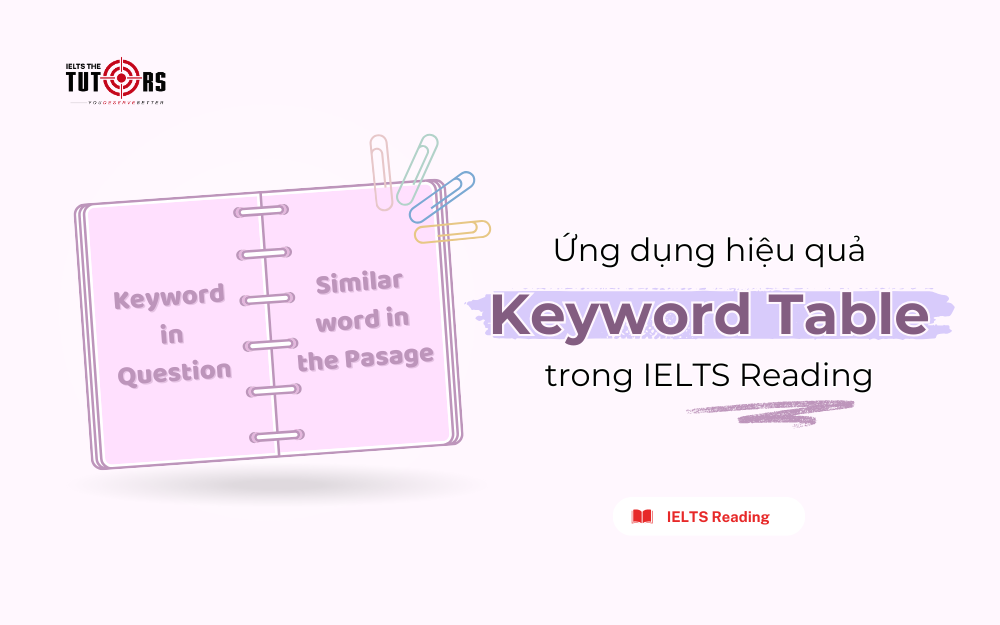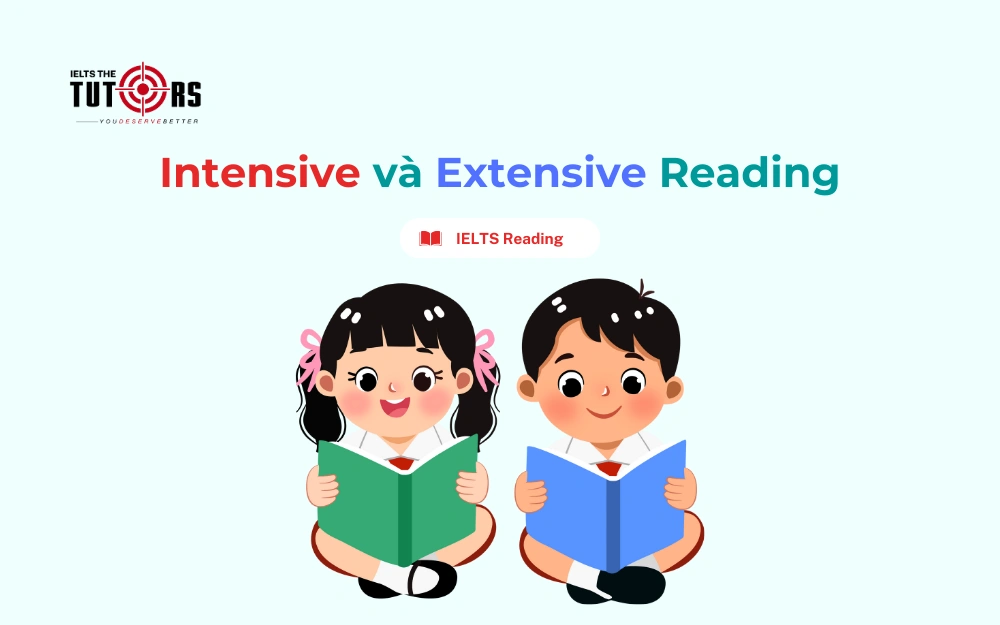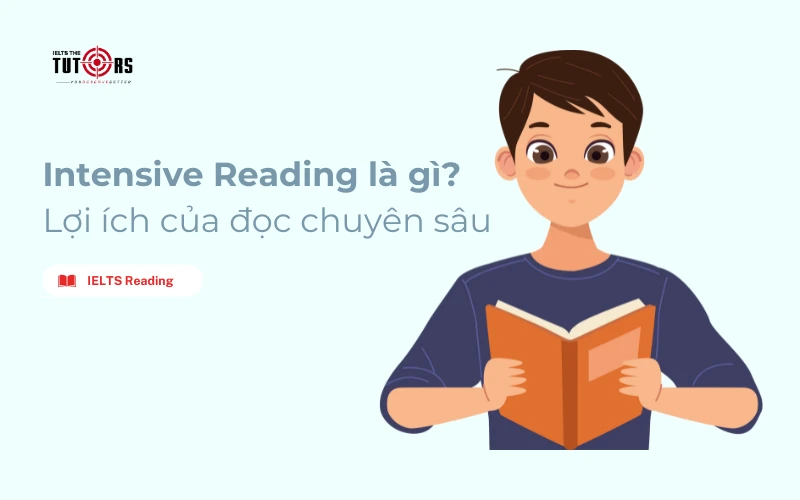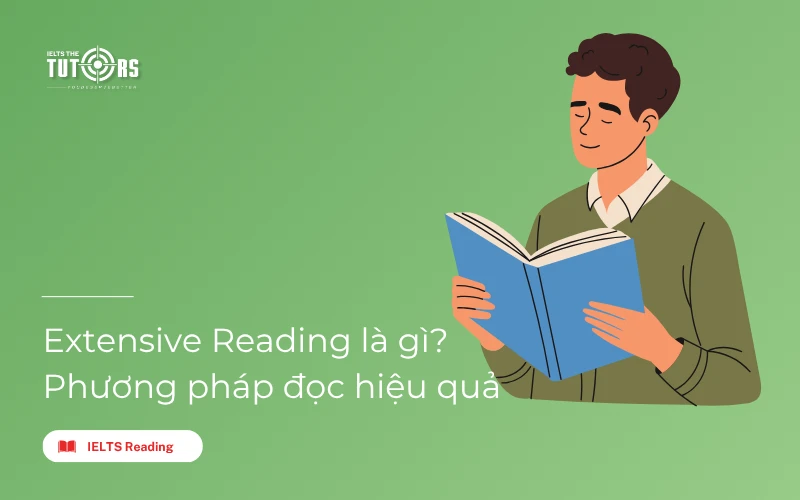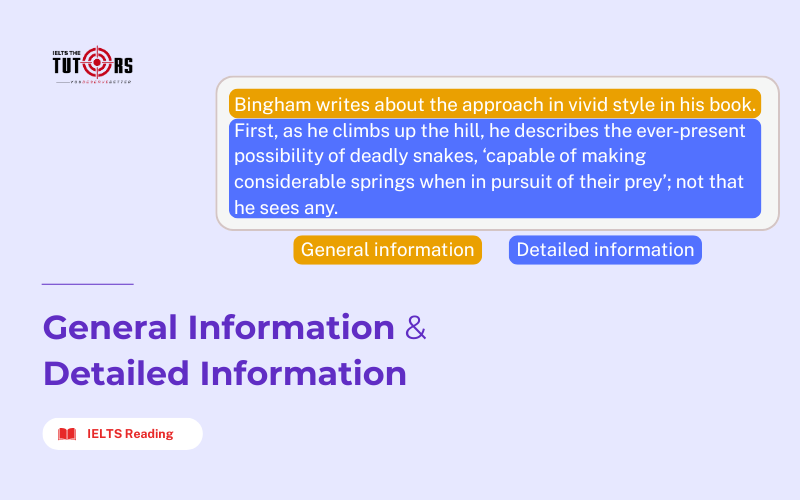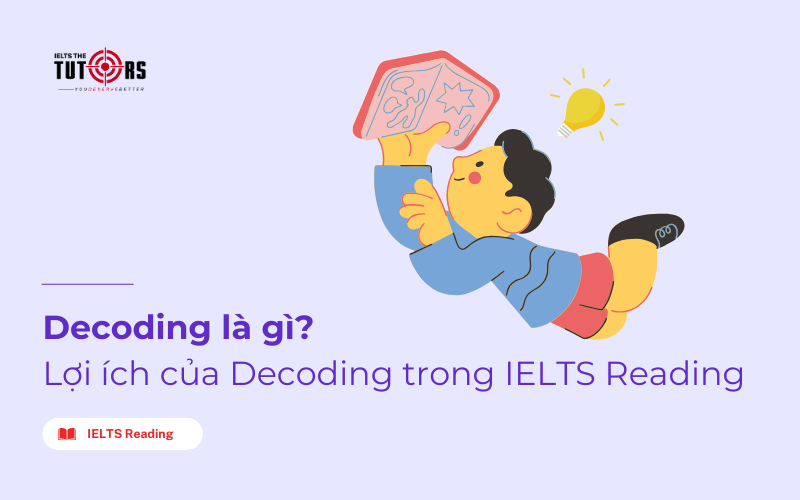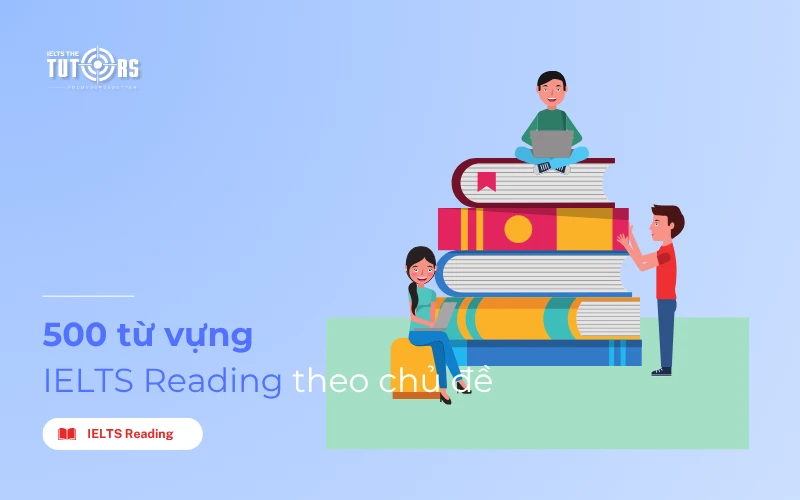
Trong kì thi IELTS, phần thi Reading thường gây không ít khó khăn cho thí sinh. Để đạt điểm số cao trong phần thi này đòi hỏi bạn cần nắm vững một vốn từ vựng thiết yếu. Trong bài viết này, IELTS The Tutors sẽ cung cấp tổng hợp từ vựng IELTS Reading theo chủ đề giúp bạn tối ưu hóa điểm số và tự tin hơn khi bắt gặp bất cứ chủ đề thi nào. Cùng khám phá nhé!
Tổng hợp từ vựng IELTS Reading theo chủ đề
Danh sách những từ vựng IELTS Reading theo chủ đề dưới đây không chỉ giúp bạn mở rộng vốn từ vựng cần thiết cho phần thi Reading mà còn cung cấp sự đa dạng về kiến thức chuyên sâu trong từng lĩnh vực:
Từ vựng IELTS Reading theo chủ đề Education

| Từ vựng | Phiên âm | Ý nghĩa | Ví dụ |
| Curriculum (n) | /kəˈrɪkjələm/ | Chương trình giảng dạy | The national curriculum includes subjects such as mathematics, science, and history. |
| Pedagogy (n) | /ˈpedəɡɒdʒi/ | Phương pháp giảng dạy | Effective pedagogy is essential for successful student outcomes. |
| Scholarship (n) | /ˈskɒləʃɪp/ | Học bổng; học vấn | She received a scholarship to study abroad due to her excellent academic performance. |
| Assessment (n) | /əˈsesmənt/ | Sự đánh giá | The assessment of the students' performance will be conducted through exams and assignments. |
| Academic (adj) | /ˌækəˈdemɪk/ | Thuộc học thuật | The university is known for its academic excellence. |
| Literacy (n) | /ˈlɪtərəsi/ | Trình độ học vấn; khả năng đọc viết | Improving literacy rates is a key goal of the education reform program. |
| Tuition (n) | /tjuˈɪʃn/ | Học phí | The tuition fees for international students are higher than those for domestic students. |
| Vocational (adj) | /vəʊˈkeɪʃənl/ | Thuộc nghề nghiệp, hướng nghiệp | Vocational training provides students with skills directly applicable to specific careers. |
| Extracurricular (adj) | /ˌekstrəkəˈrɪkjələr/ | Ngoại khóa | Extracurricular activities help students develop soft skills such as teamwork and leadership. |
| Enrollment (n) | /ɪnˈrəʊlmənt/ | Sự ghi danh, đăng ký học | Enrollment in higher education institutions has increased significantly in recent years. |
| Discipline (n) | /ˈdɪsɪplɪn/ | Kỷ luật; ngành học | Maintaining discipline in the classroom is essential for effective teaching. |
| Syllabus (n) | /ˈsɪləbəs/ | Đề cương môn học | The professor provided a detailed syllabus outlining the course requirements. |
| Cognitive (adj) | /ˈkɒɡnətɪv/ | Thuộc về nhận thức | Cognitive development is a key focus in early childhood education. |
| Higher education (n) | /ˈhaɪər ˌedʒuˈkeɪʃn/ | Giáo dục đại học | Many students choose to pursue higher education to improve their career prospects. |
| Qualification (n) | /ˌkwɒlɪfɪˈkeɪʃn/ | Trình độ chuyên môn; bằng cấp | A university degree is often considered a basic qualification for many jobs. |
| Distance learning (n) | /ˈdɪstəns ˈlɜːnɪŋ/ | Học từ xa | Distance learning has become more popular with the rise of online education platforms. |
| Plagiarism (n) | /ˈpleɪdʒərɪzəm/ | Sự đạo văn | Plagiarism is a serious academic offense that can result in expulsion. |
| Primary education (n) | /ˈpraɪməri ˌedʒuˈkeɪʃn/ | Giáo dục tiểu học | Primary education focuses on foundational skills in literacy and numeracy. |
| Secondary education (n) | /ˈsekəndri ˌedʒuˈkeɪʃn/ | Giáo dục trung học | Secondary education often prepares students for higher education or vocational training. |
| E-learning (n) | /ˈiː ˌlɜːnɪŋ/ | Học trực tuyến | E-learning platforms like Coursera and Udemy offer a variety of courses. |
| Compulsory (adj) | /kəmˈpʌlsəri/ | Bắt buộc | Education is compulsory for children between the ages of 6 and 16 in most countries. |
| Faculty (n) | /ˈfæklti/ | Khoa, giảng viên | She is a member of the faculty of the Business Administration department. |
| Postgraduate (n/adj) | /ˌpəʊstˈɡrædʒuət/ | Sau đại học; nghiên cứu sinh | He is pursuing a postgraduate degree in environmental science. |
| Undergraduate (n/adj) | /ˌʌndəˈɡrædʒuət/ | Bậc đại học; sinh viên đại học | Most undergraduate courses last for three to four years. |
| Mentor (n) | /ˈmentɔːr/ | Người hướng dẫn, cố vấn | A good mentor can provide valuable guidance for personal and professional growth. |
| Apprenticeship (n) | /əˈprentɪʃɪp/ | Thời gian học nghề | The apprenticeship program combines hands-on experience with classroom instruction. |
| Knowledge (n) | /ˈnɒlɪdʒ/ | Kiến thức | Gaining knowledge is one of the main goals of education. |
| Seminar (n) | /ˈsemɪnɑːr/ | Hội thảo, buổi thảo luận | Students are required to participate in weekly seminars as part of the course. |
| Discipline-specific (adj) | /ˈdɪsɪplɪn ˈspesɪfɪk/ | Chuyên ngành cụ thể | Discipline-specific knowledge is essential for advanced research in any academic field. |
| Scholarship holder (n) | /ˈskɒləʃɪp ˈhəʊldər/ | Người nhận học bổng | As a scholarship holder, she has her tuition fees fully covered. |
| Peer review (n) | /ˈpɪə rɪˌvjuː/ | Đánh giá ngang hàng | Peer review ensures the quality and credibility of academic publications. |
| Educational attainment (n) | /ˌedʒuˈkeɪʃənl əˈteɪnmənt/ | Thành tích học tập | Educational attainment is a key indicator of social and economic mobility. |
| Multidisciplinary (adj) | /ˌmʌltidɪsəˈplɪnəri/ | Đa ngành | Multidisciplinary approaches are often used in solving complex global issues. |
| Foundation course (n) | /faʊnˈdeɪʃn ˌkɔːs/ | Khóa học dự bị | The foundation course helps international students adapt to the academic environment. |
Xem thêm: Từ vựng chủ đề Education dùng trong IELTS Speaking
Từ vựng Reading IELTS theo chủ đề Work
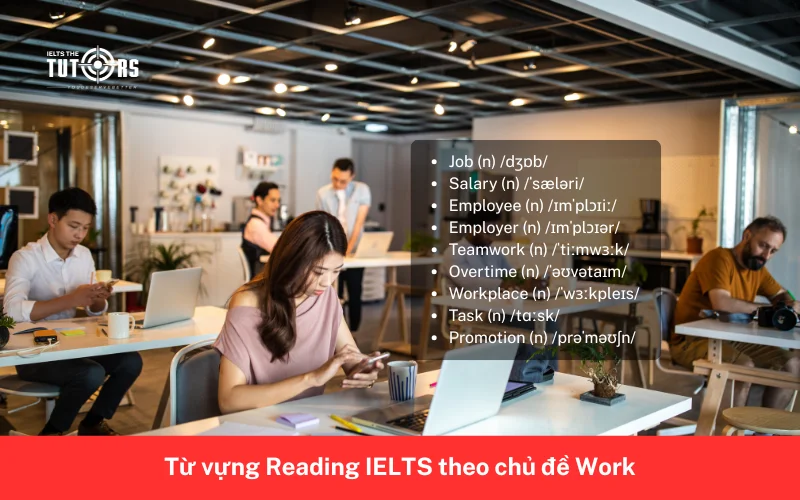
| Từ vựng | Phiên âm | Ý nghĩa | Ví dụ |
| Job (n) | /dʒɒb/ | Công việc | She found a new job as a teacher in a local school. |
| Salary (n) | /ˈsæləri/ | Lương | The company offers competitive salaries for its employees. |
| Employee (n) | /ɪmˈplɔɪiː/ | Nhân viên | The employees are entitled to annual leave and health insurance. |
| Employer (n) | /ɪmˈplɔɪər/ | Nhà tuyển dụng | The employer is responsible for ensuring workplace safety. |
| Teamwork (n) | /ˈtiːmwɜːk/ | Làm việc nhóm | Teamwork is essential for the success of any project. |
| Overtime (n) | /ˈəʊvətaɪm/ | Làm thêm giờ | Many employees work overtime to meet project deadlines. |
| Workplace (n) | /ˈwɜːkpleɪs/ | Nơi làm việc | The workplace environment greatly influences employee productivity. |
| Task (n) | /tɑːsk/ | Nhiệm vụ | Completing daily tasks efficiently is crucial for career advancement. |
| Promotion (n) | /prəˈməʊʃn/ | Sự thăng chức | He received a promotion after five years of dedicated service. |
| Resume (n) | /ˈrezjuːmeɪ/ | Sơ yếu lý lịch | A well-structured resume increases your chances of getting hired. |
| Professional development (n) | /prəˌfeʃənl dɪˈveləpmənt/ | Phát triển chuyên môn | Attending conferences is part of professional development in many careers. |
| Job satisfaction (n) | /dʒɒb ˌsætɪsˈfækʃn/ | Sự hài lòng trong công việc | Job satisfaction often depends on work-life balance and a supportive environment. |
| Redundancy (n) | /rɪˈdʌndənsi/ | Sự dư thừa nhân viên, mất việc | Many workers faced redundancy during the economic downturn. |
| Freelance (adj/v) | /ˈfriːlɑːns/ | Làm nghề tự do | She decided to work freelance to have more flexibility in her schedule. |
| Workload (n) | /ˈwɜːkləʊd/ | Khối lượng công việc | The excessive workload is causing stress among employees. |
| Entrepreneur (n) | /ˌɒntrəprəˈnɜːr/ | Doanh nhân | Successful entrepreneurs are often risk-takers and innovators. |
| Internship (n) | /ˈɪntɜːnʃɪp/ | Kỳ thực tập | Completing an internship can provide valuable work experience. |
| Work-life balance (n) | /wɜːk laɪf ˈbæləns/ | Cân bằng giữa công việc và cuộc sống | Maintaining a healthy work-life balance is crucial for mental well-being. |
| Corporate culture (n) | /ˈkɔːpərət ˈkʌltʃər/ | Văn hóa doanh nghiệp | A positive corporate culture can improve employee retention. |
| Remuneration (n) | /rɪˌmjuːnəˈreɪʃn/ | Tiền công, thù lao | The remuneration package includes a generous salary and additional benefits. |
| Burnout (n) | /ˈbɜːnaʊt/ | Sự kiệt sức vì công việc | Long hours and high pressure often lead to employee burnout. |
| Workforce (n) | /ˈwɜːkfɔːs/ | Lực lượng lao động | The company plans to expand its workforce in the coming year. |
| Productivity (n) | /ˌprɒdʌkˈtɪvəti/ | Năng suất | Increasing productivity is a key focus for many organizations. |
| Hierarchical (adj) | /ˌhaɪəˈrɑːkɪkl/ | Có tính phân cấp | The company has a hierarchical structure with several management levels. |
| Job security (n) | /dʒɒb sɪˈkjʊərəti/ | Sự đảm bảo công việc | Job security is an important factor for employees when choosing a career. |
| Delegate (v) | /ˈdelɪɡeɪt/ | Ủy quyền, giao việc | A good manager knows how to delegate tasks effectively. |
| Autonomous (adj) | /ɔːˈtɒnəməs/ | Tự chủ | An autonomous work environment empowers employees to make decisions. |
| Downsizing (n) | /ˈdaʊnsaɪzɪŋ/ | Thu nhỏ quy mô công ty | Downsizing is often necessary during economic recessions. |
| Glass ceiling (n) | /ɡlɑːs ˈsiːlɪŋ/ | Rào cản vô hình trong sự thăng tiến | Many women face a glass ceiling in male-dominated industries. |
| Industrial action (n) | /ɪnˈdʌstriəl ˈækʃn/ | Hành động đình công | The workers threatened industrial action if their demands were not met. |
Từ vựng IELTS Reading theo chủ đề Health
| Từ vựng | Phiên âm | Ý nghĩa | Ví dụ |
| Health (n) | /hɛlθ/ | Sức khỏe | Maintaining good health requires a balanced diet and regular exercise. |
| Illness (n) | /ˈɪlnəs/ | Căn bệnh | Common illnesses include colds and the flu. |
| Disease (n) | /dɪˈziːz/ | Bệnh tật | Heart disease is one of the leading causes of death worldwide. |
| Treatment (n) | /ˈtriːtmənt/ | Điều trị | The treatment for the disease includes medication and therapy. |
| Medicine (n) | /ˈmɛdɪsɪn/ | Thuốc | You should always follow the doctor's instructions when taking medicine. |
| Exercise (n/v) | /ˈɛksəsaɪz/ | Tập thể dục | Regular exercise is essential for maintaining a healthy lifestyle. |
| Diet (n) | /ˈdaɪət/ | Chế độ ăn uống | A healthy diet includes plenty of fruits and vegetables. |
| Doctor (n) | /ˈdɒktər/ | Bác sĩ | She went to see a doctor about her persistent cough. |
| Patient (n) | /ˈpeɪʃnt/ | Bệnh nhân | The hospital admitted five new patients yesterday. |
| Hospital (n) | /ˈhɒspɪtl/ | Bệnh viện | The hospital provides high-quality care for its patients. |
| Public health (n) | /ˈpʌblɪk hɛlθ/ | Sức khỏe cộng đồng | Governments invest heavily in public health initiatives like vaccination programs. |
| Epidemic (n) | /ˌɛpɪˈdɛmɪk/ | Dịch bệnh | The epidemic spread rapidly across the region. |
| Vaccination (n) | /ˌvæksɪˈneɪʃn/ | Tiêm chủng | Vaccination is the most effective way to prevent infectious diseases. |
| Chronic (adj) | /ˈkrɒnɪk/ | Mãn tính | Chronic diseases like diabetes require long-term management. |
| Mental health (n) | /ˈmɛntl hɛlθ/ | Sức khỏe tinh thần | Mental health is as important as physical health. |
| Immune system (n) | /ɪˈmjuːn ˈsɪstəm/ | Hệ miễn dịch | A strong immune system helps the body fight off infections. |
| Nutrition (n) | /njuːˈtrɪʃn/ | Dinh dưỡng | Proper nutrition is crucial for growth and development. |
| Obesity (n) | /əʊˈbiːsɪti/ | Béo phì | Obesity can lead to serious health problems such as heart disease. |
| Hygiene (n) | /ˈhaɪdʒiːn/ | Vệ sinh | Good personal hygiene reduces the risk of infections. |
| Preventive care (n) | /prɪˈvɛntɪv keər/ | Chăm sóc phòng ngừa | Preventive care, such as regular check-ups, helps identify issues early. |
| Symptom (n) | /ˈsɪmptəm/ | Triệu chứng | A cough is a common symptom of a cold. |
| Recovery (n) | /rɪˈkʌvəri/ | Sự hồi phục | His recovery from surgery was faster than expected. |
| Prescription (n) | /prɪˈskrɪpʃn/ | Đơn thuốc | The doctor gave her a prescription for antibiotics. |
| Fatigue (n) | /fəˈtiːɡ/ | Sự mệt mỏi | Fatigue is a common side effect of working long hours. |
| Wellness (n) | /ˈwɛlnəs/ | Sự khỏe mạnh toàn diện | Wellness programs at workplaces focus on mental and physical health. |
Xem thêm: IELTS Health Vocabulary – Từ vựng IELTS chủ đề sức khỏe
Từ vựng IELTS Reading theo chủ đề Environment
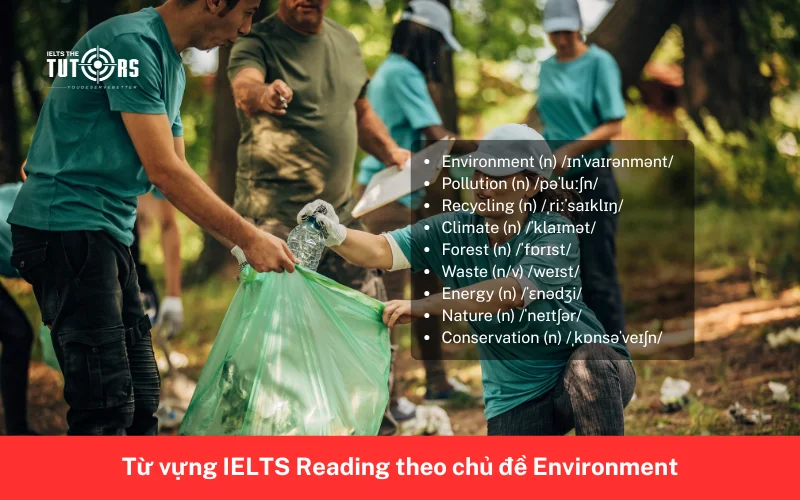
| Từ vựng | Phiên âm | Ý nghĩa | Ví dụ |
| Environment (n) | /ɪnˈvaɪrənmənt/ | Môi trường | We must take action to protect the environment from pollution. |
| Pollution (n) | /pəˈluːʃn/ | Ô nhiễm | Air pollution is a serious problem in many major cities. |
| Recycling (n) | /ˌriːˈsaɪklɪŋ/ | Tái chế | Recycling reduces waste and saves natural resources. |
| Climate (n) | /ˈklaɪmət/ | Khí hậu | The global climate is changing at an alarming rate. |
| Forest (n) | /ˈfɒrɪst/ | Rừng | Forests play a crucial role in maintaining the Earth's oxygen levels. |
| Waste (n/v) | /weɪst/ | Rác thải; lãng phí | We need to find better ways to manage waste and reduce landfill usage. |
| Energy (n) | /ˈɛnədʒi/ | Năng lượng | Renewable energy sources like solar and wind are becoming more popular. |
| Nature (n) | /ˈneɪtʃər/ | Thiên nhiên | Spending time in nature can improve mental well-being. |
| Conservation (n) | /ˌkɒnsəˈveɪʃn/ | Bảo tồn | Conservation efforts are crucial for endangered species. |
| Deforestation (n) | /ˌdiːˌfɒrɪˈsteɪʃn/ | Nạn phá rừng | Deforestation leads to loss of biodiversity and contributes to climate change. |
| Emission (n) | /ɪˈmɪʃn/ | Khí thải | Factories need to reduce their emissions to meet environmental regulations. |
| Organic (adj) | /ɔːˈɡænɪk/ | Hữu cơ | Organic farming avoids the use of synthetic pesticides and fertilizers. |
| Contamination (n) | /kənˌtæmɪˈneɪʃn/ | Sự ô nhiễm | Water contamination poses serious health risks to communities. |
| Landfill (n) | /ˈlændfɪl/ | Bãi rác | Most waste ends up in landfills, which contribute to soil and water pollution. |
| Ozone layer (n) | /ˈəʊzəʊn ˈleɪər/ | Tầng ozone | The ozone layer protects the Earth from harmful ultraviolet rays. |
| Biodiversity (n) | /ˌbaɪəʊdaɪˈvɜːsɪti/ | Đa dạng sinh học | Protecting biodiversity is essential for ecosystem stability. |
| Ecosystem (n) | /ˈiːkəʊˌsɪstəm/ | Hệ sinh thái | Human activities are disrupting delicate ecosystems around the world. |
| Renewable (adj) | /rɪˈnjuːəbl/ | Có thể tái tạo | Solar power is a renewable energy source. |
| Sustainability (n) | /səˌsteɪnəˈbɪləti/ | Sự bền vững | Sustainability should be a core goal of modern agriculture. |
| Carbon footprint (n) | /ˈkɑːbən ˈfʊtprɪnt/ | Lượng khí CO2 thải ra | Reducing your carbon footprint can help combat climate change. |
| Greenhouse gases (n) | /ˈɡriːnhaʊs ˈɡæsɪz/ | Khí nhà kính | The increase in greenhouse gases is a major contributor to global warming. |
| Fossil fuels (n) | /ˈfɒsl ˌfjʊəlz/ | Nhiên liệu hóa thạch | Burning fossil fuels releases carbon dioxide into the atmosphere. |
| Urbanization (n) | /ˌɜːbənaɪˈzeɪʃn/ | Đô thị hóa | Urbanization often leads to habitat destruction and increased pollution. |
| Habitat (n) | /ˈhæbɪtæt/ | Môi trường sống | Wildlife conservation aims to protect natural habitats. |
| Extinction (n) | /ɪkˈstɪŋkʃn/ | Sự tuyệt chủng | Many species face extinction due to human activity. |
Từ vựng IELTS Reading theo chủ đề Culture
| Từ vựng | Phiên âm | Ý nghĩa | Ví dụ |
| Culture (n) | /ˈkʌltʃər/ | Văn hóa | Each country has its own unique culture and traditions. |
| Tradition (n) | /trəˈdɪʃn/ | Truyền thống | Lunar New Year is an important tradition in many Asian countries. |
| Heritage (n) | /ˈhɛrɪtɪdʒ/ | Di sản | UNESCO protects world heritage sites to preserve cultural history. |
| Custom (n) | /ˈkʌstəm/ | Phong tục | It is a custom in Japan to bow as a greeting. |
| Festival (n) | /ˈfɛstɪvl/ | Lễ hội | The Lantern Festival is a colorful celebration in many parts of Asia. |
| Religion (n) | /rɪˈlɪdʒən/ | Tôn giáo | Religion often plays a significant role in shaping a culture. |
| Art (n) | /ɑːt/ | Nghệ thuật | Art reflects the beliefs and values of a society. |
| Language (n) | /ˈlæŋɡwɪdʒ/ | Ngôn ngữ | Language is an important part of cultural identity. |
| Celebration (n) | /ˌsɛlɪˈbreɪʃn/ | Sự kỷ niệm, lễ kỷ niệm | The city held a celebration to mark its 100th anniversary. |
| History (n) | /ˈhɪstəri/ | Lịch sử | Understanding history is essential to appreciating cultural heritage. |
| Diversity (n) | /daɪˈvɜːsɪti/ | Sự đa dạng | Cultural diversity enriches societies and promotes understanding. |
| Values (n) | /ˈvæljuːz/ | Giá trị | Respect and honesty are core values in many cultures. |
| Hospitality (n) | /ˌhɒspɪˈtæləti/ | Lòng hiếu khách | Hospitality is a hallmark of many traditional cultures. |
| Belief (n) | /bɪˈliːf/ | Niềm tin | Cultural beliefs often influence social behavior. |
| Ceremonial (adj) | /ˌsɛrɪˈməʊniəl/ | Mang tính nghi lễ | Ceremonial dances are an important part of indigenous traditions. |
| Multicultural (adj) | /ˌmʌltiˈkʌltʃərəl/ | Đa văn hóa | A multicultural society embraces diversity and inclusivity. |
| Ethnicity (n) | /ɛθˈnɪsɪti/ | Dân tộc, sắc tộc | Ethnicity often influences cultural practices and traditions. |
| Folklore (n) | /ˈfəʊklɔːr/ | Văn hóa dân gian | Folklore includes myths, legends, and traditional stories passed down through generations. |
| Cultural assimilation (n) | /ˈkʌltʃərəl əˌsɪmɪˈleɪʃn/ | Đồng hóa văn hóa | Cultural assimilation occurs when a minority group adopts the customs of the dominant culture. |
| Norms (n) | /nɔːmz/ | Chuẩn mực, quy tắc | Social norms vary greatly across different cultures. |
| Intangible heritage (n) | /ɪnˈtændʒəbl ˈhɛrɪtɪdʒ/ | Di sản phi vật thể | Intangible heritage includes music, dance, and oral traditions. |
| Cultural identity (n) | /ˈkʌltʃərəl aɪˈdɛntɪti/ | Bản sắc văn hóa | Preserving cultural identity is important for future generations. |
| Ritual (n) | /ˈrɪtʃuəl/ | Nghi lễ | Traditional rituals are performed during festivals and ceremonies. |
| Globalization (n) | /ˌɡləʊbəlaɪˈzeɪʃn/ | Toàn cầu hóa | Globalization has both positive and negative effects on cultural preservation. |
| Cultural relativism (n) | /ˈkʌltʃərəl ˈrɛlətɪvɪzəm/ | Chủ nghĩa tương đối văn hóa | Cultural relativism emphasizes understanding cultures without judgment. |
Từ vựng IELTS Reading theo chủ đề Tourism
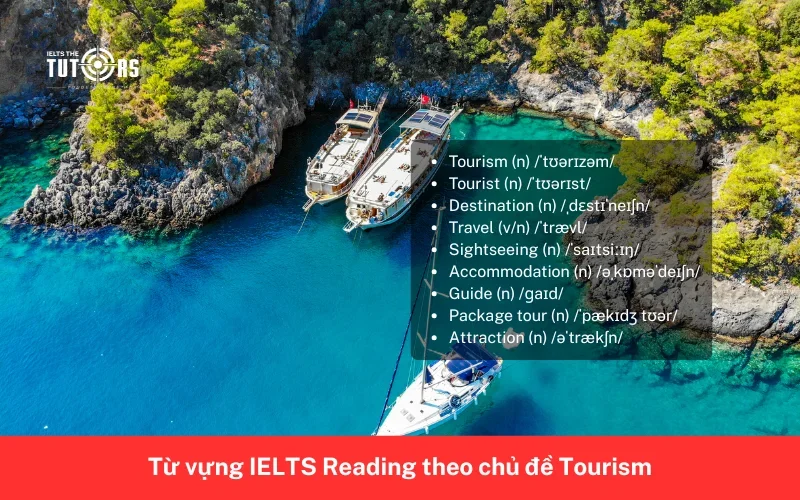
| Từ vựng | Phiên âm | Ý nghĩa | Ví dụ |
| Tourism (n) | /ˈtʊərɪzəm/ | Ngành du lịch | Tourism is a major source of income for many countries. |
| Tourist (n) | /ˈtʊərɪst/ | Khách du lịch | The museum attracts thousands of tourists every year. |
| Destination (n) | /ˌdɛstɪˈneɪʃn/ | Điểm đến | Paris is one of the most popular tourist destinations in the world. |
| Travel (v/n) | /ˈtrævl/ | Du lịch, sự đi lại | People often travel during holidays to explore new places. |
| Sightseeing (n) | /ˈsaɪtsiːɪŋ/ | Ngắm cảnh | We spent the day sightseeing in Rome, visiting the Colosseum and Vatican City. |
| Accommodation (n) | /əˌkɒməˈdeɪʃn/ | Chỗ ở | The hotel provides comfortable accommodation for tourists. |
| Guide (n) | /ɡaɪd/ | Hướng dẫn viên | The tour guide explained the history of the ancient temple. |
| Package tour (n) | /ˈpækɪdʒ tʊər/ | Chuyến du lịch trọn gói | Many people prefer package tours for convenience. |
| Attraction (n) | /əˈtrækʃn/ | Điểm tham quan | The Eiffel Tower is a famous tourist attraction in France. |
| Budget (n/adj) | /ˈbʌdʒɪt/ | Ngân sách; rẻ tiền | There are many budget options for travelers, including hostels and budget airlines. |
| Cruise (n) | /kruːz/ | Chuyến du lịch bằng tàu | The Mediterranean cruise offers breathtaking views and luxury accommodations. |
| Resort (n) | /rɪˈzɔːt/ | Khu nghỉ dưỡng | The island resort is known for its crystal-clear waters and white sandy beaches. |
| Excursion (n) | /ɪkˈskɜːʒn/ | Chuyến tham quan ngắn | The day excursion included visits to local markets and temples. |
| Landmark (n) | /ˈlændmɑːrk/ | Cột mốc, địa danh | Big Ben is one of London's most iconic landmarks. |
| Souvenir (n) | /ˌsuːvəˈnɪər/ | Quà lưu niệm | Tourists often buy souvenirs to remember their trips. |
| Ecotourism (n) | /ˈiːkəʊˌtʊərɪzəm/ | Du lịch sinh thái | Ecotourism promotes environmental conservation and benefits local communities. |
| Sustainable tourism (n) | /səˈsteɪnəbl ˈtʊərɪzəm/ | Du lịch bền vững | Sustainable tourism aims to minimize the environmental impact of traveling. |
| Over-tourism (n) | /ˈəʊvərˌtʊərɪzəm/ | Tình trạng du lịch quá tải | Over-tourism has caused serious damage to many historic sites. |
| Cultural tourism (n) | /ˈkʌltʃərəl ˈtʊərɪzəm/ | Du lịch văn hóa | Cultural tourism allows travelers to learn about traditions and heritage. |
| Heritage site (n) | /ˈhɛrɪtɪdʒ saɪt/ | Di sản | UNESCO-listed heritage sites attract millions of visitors each year. |
| Hospitality industry (n) | /ˌhɒspɪˈtæləti ˈɪndəstri/ | Ngành công nghiệp dịch vụ du lịch | The hospitality industry includes hotels, restaurants, and event planning. |
| Itinerary (n) | /aɪˈtɪnərəri/ | Lịch trình | The travel agency provided us with a detailed itinerary for the trip. |
| Influx (n) | /ˈɪnflʌks/ | Sự tràn vào, dòng người | The influx of tourists during the summer boosts the local economy. |
| Expenditure (n) | /ɪkˈspɛndɪtʃər/ | Chi phí, sự tiêu dùng | Travel expenditures have increased due to rising fuel costs. |
| Niche tourism (n) | /niːʃ ˈtʊərɪzəm/ | Du lịch chuyên biệt | Niche tourism focuses on specialized interests like adventure travel or culinary tours. |
Từ vựng IELTS Reading theo chủ đề Technology
| Từ vựng | Phiên âm | Ý nghĩa | Ví dụ |
| Technology (n) | /tɛkˈnɒlədʒi/ | Công nghệ | Advances in technology have made communication faster and easier. |
| Device (n) | /dɪˈvaɪs/ | Thiết bị | Smartphones are the most commonly used electronic devices today. |
| Innovation (n) | /ˌɪnəˈveɪʃn/ | Sự đổi mới, sáng tạo | Technological innovation is crucial for economic growth. |
| Internet (n) | /ˈɪntərˌnɛt/ | Mạng Internet | The Internet has transformed the way people access information. |
| Digital (adj) | /ˈdɪdʒɪtl/ | Kỹ thuật số | Digital platforms allow people to connect across the globe. |
| Software (n) | /ˈsɒftweər/ | Phần mềm | This software is used to analyze data and generate reports. |
| Hardware (n) | /ˈhɑːdweər/ | Phần cứng | The hardware of this computer is outdated. |
| Automation (n) | /ˌɔːtəˈmeɪʃn/ | Tự động hóa | Automation has replaced many manual jobs in factories. |
| Robot (n) | /ˈrəʊbɒt/ | Robot, người máy | Robots are used in manufacturing to improve efficiency. |
| Artificial Intelligence (n) | /ˌɑːtɪˈfɪʃl ɪnˈtɛlɪdʒəns/ | Trí tuệ nhân tạo | Artificial intelligence is widely applied in various industries. |
| Innovation hub (n) | /ˌɪnəˈveɪʃn hʌb/ | Trung tâm đổi mới sáng tạo | Silicon Valley is known as a global innovation hub. |
| Encryption (n) | /ɪnˈkrɪpʃn/ | Mã hóa | Encryption ensures that sensitive information is secure. |
| Smart device (n) | /smɑːt dɪˈvaɪs/ | Thiết bị thông minh | Smart devices like smartwatches are becoming increasingly popular. |
| Algorithm (n) | /ˈælɡərɪðəm/ | Thuật toán | Social media platforms use algorithms to recommend content to users. |
| Innovation-driven (adj) | /ˌɪnəˈveɪʃn ˈdrɪvn/ | Dựa vào đổi mới sáng tạo | Innovation-driven economies invest heavily in research and development. |
| Cybersecurity (n) | /ˌsaɪbərsɪˈkjʊərəti/ | An ninh mạng | Companies must invest in cybersecurity to protect sensitive data. |
| Blockchain (n) | /ˈblɒktʃeɪn/ | Chuỗi khối (công nghệ lưu trữ dữ liệu) | Blockchain technology is the backbone of cryptocurrency. |
| Big data (n) | /ˌbɪɡ ˈdeɪtə/ | Dữ liệu lớn | Big data helps businesses analyze consumer behavior more effectively. |
| Cloud computing (n) | /klaʊd kəmˈpjuːtɪŋ/ | Điện toán đám mây | Cloud computing allows users to store data remotely. |
| Wearable technology (n) | /ˈwɛərəbl tɛkˈnɒlədʒi/ | Công nghệ đeo | Wearable technology like fitness trackers has become very popular. |
| Virtual reality (n) | /ˈvɜːtʃuəl rɪˈæləti/ | Thực tế ảo | Virtual reality provides an immersive experience for gamers. |
| Machine learning (n) | /məˈʃiːn ˈlɜːnɪŋ/ | Học máy | Machine learning enables computers to learn from data and make decisions. |
| Digital divide (n) | /ˈdɪdʒɪtl dɪˈvaɪd/ | Khoảng cách số | The digital divide affects access to education in rural areas. |
| Quantum computing (n) | /ˈkwɒntəm kəmˈpjuːtɪŋ/ | Máy tính lượng tử | Quantum computing has the potential to solve complex problems faster than traditional methods. |
| 5G network (n) | /ˌfaɪv ˈdʒiː ˈnɛtwɜːk/ | Mạng 5G | The 5G network offers faster internet speeds and lower latency. |
Từ vựng IELTS Reading theo chủ đề Science
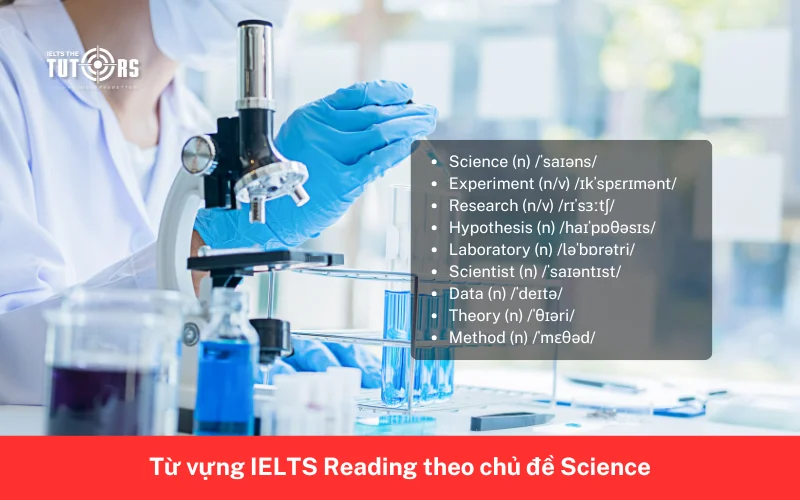
| Từ vựng | Phiên âm | Ý nghĩa | Ví dụ |
| Science (n) | /ˈsaɪəns/ | Khoa học | Science plays a crucial role in solving global challenges. |
| Experiment (n/v) | /ɪkˈspɛrɪmənt/ | Thí nghiệm; làm thí nghiệm | The experiment was conducted to test the hypothesis. |
| Research (n/v) | /rɪˈsɜːtʃ/ | Nghiên cứu | Scientists are conducting research on climate change. |
| Hypothesis (n) | /haɪˈpɒθəsɪs/ | Giả thuyết | The hypothesis was proven incorrect after testing. |
| Laboratory (n) | /ləˈbɒrətri/ | Phòng thí nghiệm | Students performed chemical experiments in the laboratory. |
| Scientist (n) | /ˈsaɪəntɪst/ | Nhà khoa học | Albert Einstein is one of the most famous scientists in history. |
| Data (n) | /ˈdeɪtə/ | Dữ liệu | Accurate data is essential for reliable results. |
| Theory (n) | /ˈθɪəri/ | Lý thuyết | The theory of evolution was introduced by Charles Darwin. |
| Method (n) | /ˈmɛθəd/ | Phương pháp | The scientific method involves observation and experimentation. |
| Discovery (n) | /dɪsˈkʌvəri/ | Sự khám phá | The discovery of penicillin revolutionized medicine. |
| Breakthrough (n) | /ˈbreɪkθruː/ | Bước đột phá | The breakthrough in cancer research offers new hope for patients. |
| Peer review (n) | /pɪə rɪˈvjuː/ | Đánh giá ngang hàng | Peer review ensures the quality and credibility of scientific publications. |
| Scientific journal (n) | /ˌsaɪənˈtɪfɪk ˈdʒɜːnl/ | Tạp chí khoa học | The findings were published in a prestigious scientific journal. |
| Ethical considerations (n) | /ˈɛθɪkl kənˌsɪdəˈreɪʃnz/ | Các cân nhắc về đạo đức | Ethical considerations are critical in genetic research. |
| Clinical trial (n) | /ˈklɪnɪkl ˈtraɪəl/ | Thử nghiệm lâm sàng | The clinical trial tested the effectiveness of the new drug. |
| Nanotechnology (n) | /ˌnænəʊtɛkˈnɒlədʒi/ | Công nghệ nano | Nanotechnology has applications in medicine and electronics. |
| Genetic engineering (n) | /dʒəˈnɛtɪk ˌɛnʤɪˈnɪərɪŋ/ | Kỹ thuật di truyền | Genetic engineering allows scientists to modify the DNA of organisms. |
| Renewable energy (n) | /rɪˈnjuːəbl ˈɛnədʒi/ | Năng lượng tái tạo | Renewable energy sources like solar and wind are essential for sustainability. |
| Empirical evidence (n) | /ɛmˈpɪrɪkl ˈɛvɪdəns/ | Bằng chứng thực nghiệm | Empirical evidence supports the theory of global warming. |
| Scientific consensus (n) | /ˌsaɪənˈtɪfɪk kənˈsɛnsəs/ | Sự đồng thuận khoa học | There is a scientific consensus on the causes of climate change. |
| Observation (n) | /ˌɒbzəˈveɪʃn/ | Sự quan sát | Careful observation of the stars led to new discoveries in astronomy. |
| Innovation (n) | /ˌɪnəˈveɪʃn/ | Sự đổi mới, sáng tạo | Innovation in medical science has saved millions of lives. |
| Specimen (n) | /ˈspɛsɪmɪn/ | Mẫu vật | The specimen was collected from a rare species of plant. |
| Microscopic (adj) | /ˌmaɪkrəˈskɒpɪk/ | Siêu nhỏ | The microscopic organisms were visible only under a microscope. |
| Controversy (n) | /ˈkɒntrəvɜːsi/ | Sự tranh cãi | There is a controversy surrounding the use of artificial intelligence in warfare. |
Từ vựng IELTS Reading theo chủ đề Economy
| Từ vựng | Phiên âm | Ý nghĩa | Ví dụ |
| Economy (n) | /ɪˈkɒnəmi/ | Nền kinh tế | The global economy has been affected by the pandemic. |
| Market (n) | /ˈmɑːkɪt/ | Thị trường | The stock market fluctuates depending on economic trends. |
| Trade (n/v) | /treɪd/ | Thương mại; giao dịch | Trade agreements between countries can boost economic growth. |
| Investment (n) | /ɪnˈvɛstmənt/ | Sự đầu tư | Foreign investment plays a key role in the country’s development. |
| Inflation (n) | /ɪnˈfleɪʃn/ | Lạm phát | High inflation reduces the purchasing power of consumers. |
| Recession (n) | /rɪˈsɛʃn/ | Suy thoái kinh tế | The country is recovering from a severe economic recession. |
| Consumer (n) | /kənˈsjuːmə/ | Người tiêu dùng | Consumer spending has increased due to lower interest rates. |
| Tax (n/v) | /tæks/ | Thuế; đánh thuế | Governments collect taxes to fund public services. |
| Profit (n) | /ˈprɒfɪt/ | Lợi nhuận | The company reported a significant increase in profits this year. |
| Employment (n) | /ɪmˈplɔɪmənt/ | Việc làm | Employment rates have risen in recent months. |
| Globalization (n) | /ˌɡləʊbəlaɪˈzeɪʃn/ | Toàn cầu hóa | Globalization has created opportunities for international trade. |
| Tariff (n) | /ˈtærɪf/ | Thuế quan | High tariffs can discourage international trade. |
| Unemployment (n) | /ˌʌnɪmˈplɔɪmənt/ | Thất nghiệp | The government is taking measures to reduce unemployment. |
| Deflation (n) | /dɪˈfleɪʃn/ | Giảm phát | Deflation can lead to a decrease in consumer spending. |
| Interest rate (n) | /ˈɪntrəst reɪt/ | Lãi suất | Lower interest rates encourage borrowing and investment. |
| Economic downturn (n) | /ˌiːkəˈnɒmɪk ˈdaʊntɜːn/ | Suy thoái kinh tế | The global economic downturn has affected millions of businesses. |
| Gross Domestic Product (GDP) (n) | /ɡrəʊs dəˈmɛstɪk ˈprɒdʌkt/ | Tổng sản phẩm quốc nội | The GDP of the country grew by 5% in the last quarter. |
| Fiscal policy (n) | /ˈfɪskl ˈpɒlɪsi/ | Chính sách tài khóa | Fiscal policy is used to influence a nation’s economic activity. |
| Monetary policy (n) | /ˈmʌnɪtəri ˈpɒlɪsi/ | Chính sách tiền tệ | Central banks implement monetary policy to control inflation. |
| Subsidy (n) | /ˈsʌbsɪdi/ | Trợ cấp | The government provided subsidies to farmers during the drought. |
| Economic inequality (n) | /ˌiːkəˈnɒmɪk ˌɪnɪˈkwɒləti/ | Bất bình đẳng kinh tế | Economic inequality remains a pressing issue in many countries. |
| Trade deficit (n) | /treɪd ˈdɛfɪsɪt/ | Thâm hụt thương mại | The country has been struggling with a growing trade deficit. |
| Free market (n) | /friː ˈmɑːkɪt/ | Thị trường tự do | A free market encourages competition and innovation. |
| Economic growth (n) | /ˌiːkəˈnɒmɪk ˈɡrəʊθ/ | Tăng trưởng kinh tế | Sustained economic growth is essential for reducing poverty. |
| Poverty line (n) | /ˈpɒvəti laɪn/ | Mức nghèo | Many families still live below the poverty line. |
Từ vựng IELTS Reading theo chủ đề History
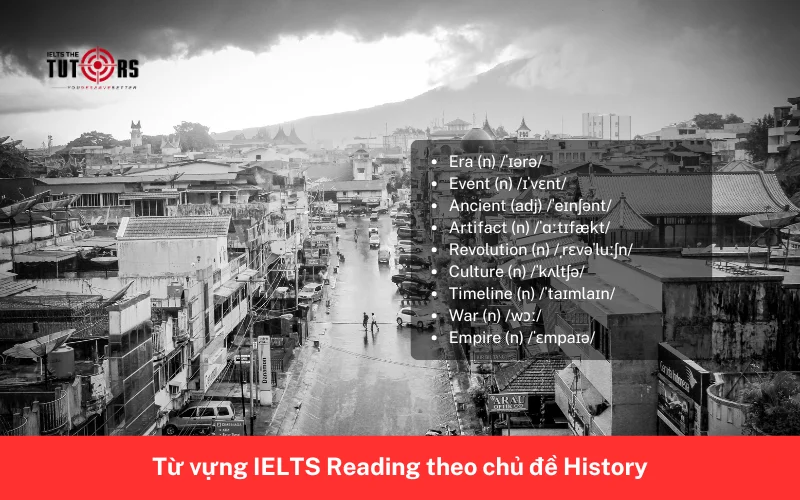
| Từ vựng | Phiên âm | Ý nghĩa | Ví dụ |
| History (n) | /ˈhɪstəri/ | Lịch sử | History teaches us valuable lessons about the past. |
| Era (n) | /ˈɪərə/ | Kỷ nguyên, thời đại | The Victorian era was marked by rapid industrial growth. |
| Event (n) | /ɪˈvɛnt/ | Sự kiện | The event was a turning point in the country’s history. |
| Ancient (adj) | /ˈeɪnʃənt/ | Cổ đại | The ancient civilization of Egypt is known for its pyramids. |
| Artifact (n) | /ˈɑːtɪfækt/ | Hiện vật | The museum displays artifacts from the Roman Empire. |
| Revolution (n) | /ˌrɛvəˈluːʃn/ | Cuộc cách mạng | The industrial revolution transformed how goods were produced. |
| Culture (n) | /ˈkʌltʃə/ | Văn hóa | Historical sites provide insight into ancient cultures. |
| Timeline (n) | /ˈtaɪmlaɪn/ | Mốc thời gian | The timeline of events helps students understand the sequence of history. |
| War (n) | /wɔː/ | Chiến tranh | World War II had a significant impact on global politics. |
| Empire (n) | /ˈɛmpaɪə/ | Đế chế | The Roman Empire expanded across Europe, North Africa, and parts of Asia. |
| Preservation (n) | /ˌprɛzəˈveɪʃn/ | Sự bảo tồn | The preservation of historical sites is essential for future generations. |
| Invasion (n) | /ɪnˈveɪʒn/ | Cuộc xâm lược | The invasion marked the beginning of a long period of conflict. |
| Treaty (n) | /ˈtriːti/ | Hiệp ước | The treaty ended the war and established new borders. |
| Civilization (n) | /ˌsɪvəlaɪˈzeɪʃn/ | Nền văn minh | Ancient civilizations like Mesopotamia made great contributions to human knowledge. |
| Colonization (n) | /ˌkɒlənaɪˈzeɪʃn/ | Sự thực dân hóa | Colonization led to cultural exchanges and conflicts. |
| Chronology (n) | /krəˈnɒlədʒi/ | Niên đại, sự sắp xếp theo thời gian | The chronology of events was carefully documented in the archives. |
| Archaeology (n) | /ˌɑːkiˈɒlədʒi/ | Khảo cổ học | Archaeology provides evidence of early human settlements. |
| Dynasty (n) | /ˈdɪnəsti/ | Triều đại | The Ming Dynasty is known for its cultural and architectural achievements. |
| Monument (n) | /ˈmɒnjumənt/ | Đài tưởng niệm, công trình kỷ niệm | The Taj Mahal is a monumental example of Mughal architecture. |
| Colonialism (n) | /kəˈləʊniəlɪzəm/ | Chủ nghĩa thực dân | Colonialism has left a lasting impact on many nations’ cultures. |
| Heritage (n) | /ˈhɛrɪtɪdʒ/ | Di sản | UNESCO protects world heritage sites of historical importance. |
| Legacy (n) | /ˈlɛɡəsi/ | Di sản (vật chất hoặc tinh thần) | The legacy of ancient Rome is evident in modern law and governance. |
| Renaissance (n) | /rɪˈneɪsəns/ | Thời kỳ Phục hưng | The Renaissance was a period of significant cultural and scientific advancements. |
| Historical context (n) | /hɪˈstɒrɪkl ˈkɒntɛkst/ | Bối cảnh lịch sử | Understanding the historical context helps to explain the significance of an event. |
| Decade (n) | /ˈdɛkeɪd/ | Thập kỷ | The 1960s was a decade of cultural change and social movements. |
Cách học từ vựng IELTS Reading hiệu quả
Từ vựng là một phần quan trọng trong việc nâng cao kỹ năng Reading, đồng thời giúp bạn cải thiện toàn diện các kỹ năng khác trong bài thi IELTS. Dưới đây là các phương pháp học từ vựng IELTS Reading hiệu quả, giúp bạn đạt điểm cao trong bài thi:
Học từ vựng theo chủ đề
Học từ vựng Reading IELTS theo các nhóm chủ đề phổ biến (như môi trường, giáo dục, công nghệ, sức khỏe,…) giúp bạn ghi nhớ từ một cách hệ thống. Khi học từ theo chủ đề, bạn sẽ dễ dàng nhận diện các từ trong ngữ cảnh bài đọc, tăng tốc độ xử lý thông tin và cải thiện khả năng liên kết ý tưởng.
Mẹo nhỏ: Hãy tạo sơ đồ tư duy (mind map) để nhóm các từ liên quan và bổ sung ví dụ cho từng từ.
Tập trung vào từ đồng nghĩa và trái nghĩa
Bài thi IELTS Reading thường kiểm tra khả năng nhận diện từ đồng nghĩa (synonyms) hoặc trái nghĩa (antonyms) qua các dạng câu hỏi như Matching Headings hoặc True/False/Not Given. Do đó, việc học từ đồng nghĩa và trái nghĩa không chỉ giúp bạn mở rộng vốn từ mà còn tăng khả năng trả lời câu hỏi chính xác.
Ví dụ:
- Từ gốc: important
- Đồng nghĩa: crucial, significant, essential
- Trái nghĩa: insignificant, trivial, negligible
Học từ vựng trong ngữ cảnh cụ thể
Thay vì học thuộc từ riêng lẻ, hãy học từ vựng thông qua các câu hoặc đoạn văn ngắn. Ngữ cảnh cụ thể giúp bạn hiểu rõ cách sử dụng từ và ghi nhớ lâu hơn:
- Trích dẫn các câu chứa từ vựng từ tài liệu đọc IELTS.
- Viết lại câu theo cách của bạn để kiểm tra sự hiểu biết.
Lập kế hoạch học tập với mục tiêu rõ ràng
Chia nhỏ lượng từ vựng cần học mỗi ngày và đặt mục tiêu cụ thể (ví dụ: học 10 từ mới/ngày). Kế hoạch học tập có thể bao gồm:
- Buổi sáng: Ôn lại từ đã học hôm trước.
- Buổi chiều: Học từ mới qua bài đọc.
- Buổi tối: Kiểm tra bằng cách tự viết câu hoặc sử dụng ứng dụng học tập.
Đọc tài liệu tiếng Anh đa dạng
Thói quen đọc sách, báo và các bài viết học thuật không chỉ cải thiện kỹ năng đọc hiểu mà còn làm phong phú vốn từ vựng của bạn. Hãy ưu tiên các tài liệu phù hợp với chủ đề thường xuất hiện trong bài thi IELTS, như:
- Tạp chí: National Geographic, The Economist, BBC News.
- Sách học thuật: Các sách hướng dẫn về môi trường, y học, công nghệ.
Sử dụng ứng dụng học từ vựng
Các ứng dụng như Anki, Quizlet, Memrise cho phép bạn tạo các thẻ ghi nhớ (flashcards) với hình ảnh, âm thanh và ví dụ sinh động. Học từ qua ứng dụng không chỉ tiện lợi mà còn giúp bạn ôn tập thường xuyên mọi lúc, mọi nơi.
Lưu ý: Hãy đặt ưu tiên học các từ thường gặp trong danh sách từ vựng học thuật (Academic Word List – AWL).
Tham gia khóa học IELTS chuyên sâu
Nếu bạn gặp khó khăn trong việc tự học, tham gia một khóa học IELTS là lựa chọn đáng cân nhắc. Tại đây, bạn sẽ được hướng dẫn chiến lược học từ vựng phù hợp, thực hành các bài tập Reading sát với đề thi thực tế và nhận sự hỗ trợ từ giáo viên cũng như các bạn học.
Một số lưu ý khi làm bài IELTS Reading
Ngoài ra, bên cạnh việc học những từ vựng IELTS Reading thông dụng ở trên. Để tối ưu điểm số của bạn, IELTS The Tutors muốn gửi đến bạn một vài lưu ý quan trọng khi làm bài:
- Đọc câu hỏi trước: Xem câu hỏi để nắm yêu cầu trước khi đọc đoạn văn, giúp bạn tập trung tìm kiếm thông tin nhanh chóng và chính xác.
- Quản lý thời gian: Với thời gian hạn chế, hãy đọc lướt đoạn văn và tập trung vào các câu trả lời. Đừng dành quá nhiều thời gian cho một câu hỏi.
- Skimming và scanning: Áp dụng kỹ năng đọc lướt và đọc quét nhanh thông tin sẽ giúp ích rất nhiều trong bài thi IELTS Reading
- Ghi chú và gạch chân: Đánh dấu từ khóa hoặc ghi chú thông tin quan trọng, giúp bạn dễ dàng đối chiếu khi cần.
- Tập trung vào từ khóa: Xác định từ khóa trong câu hỏi và tìm chúng trong đoạn văn, đây là cách nhanh nhất để tìm câu trả lời.
- Nắm ý chính: Hiểu ý chính của từng đoạn để có cái nhìn tổng quan, hỗ trợ việc trả lời câu hỏi liên quan đến ý toàn bài.
- Đọc kỹ hướng dẫn: Chú ý các yêu cầu cụ thể như “ONE word only” hoặc “NO MORE THAN THREE WORDS” để tránh mất điểm do sai quy định.
- Mở rộng từ vựng: Học các từ vựng IELTS Reading và cụm từ liên quan đến các chủ đề phổ biến trong IELTS để cải thiện khả năng đọc hiểu và trả lời chính xác.
Trên đây là toàn bộ 500 từ vựng IELTS Reading theo chủ đề phổ biến và thông dụng nhất thường xuất hiện trong kỳ thi. Hy vọng rằng với vốn từ vựng trên cùng một số lưu ý khi làm bài, bạn sẽ biết cách ôn tập và chuẩn bị thật tốt trước khi bước vào phòng thi. Chúc bạn sớm đạt mục tiêu điểm số nhé!

